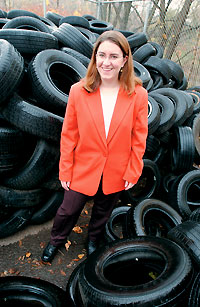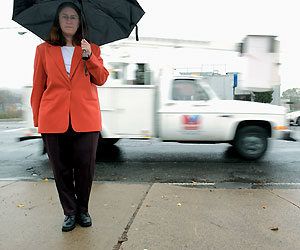When the rubber meets the road
Alison Draper, director of Trinity’s
Interdisciplinary Science Center
by Christine Palm
photographs: Nick Lacy
 Very few of us see the details and the big picture with equal
clarity. But Dr. Alison J. Draper, director of Trinity’s
Center for Interdisciplinary Science, has been doing just that
for as long as she can remember. At the age when most young women
are concerned with getting their first driver’s license,
Draper was more concerned with microscopic particles of rubber
flying off the car’s tires. Today, as a respected
toxicologist and environmental chemist, she studies how these
airborne particles get into the nation’s waterways and
potentially wreak havoc on the environment—and, she
suspects, on our health. Very few of us see the details and the big picture with equal
clarity. But Dr. Alison J. Draper, director of Trinity’s
Center for Interdisciplinary Science, has been doing just that
for as long as she can remember. At the age when most young women
are concerned with getting their first driver’s license,
Draper was more concerned with microscopic particles of rubber
flying off the car’s tires. Today, as a respected
toxicologist and environmental chemist, she studies how these
airborne particles get into the nation’s waterways and
potentially wreak havoc on the environment—and, she
suspects, on our health.
“I initially studied diesel exhaust as an undergraduate,
but found tires more interesting,” Draper explains. “Chemically
speaking, tire rubber is very complex and varies considerably
from brand to brand. And although we’ve only done
preliminary studies, I’m sure there are negative effects on
a host of aquatic organisms. Green algae are the most sensitive,
and since they are at the base of the food chain, other organisms
may be affected. My ultimate goal is to determine the toxic
compounds and suggest changes in the chemical formulation of
vehicular tires. Already, new tires are being made without carbon
black. Although these white or fluorescent colored tires were
made with fashion in mind, by eliminating the carbon black, they
have eliminated a number of carcinogenic compounds.”
Draper earned her B.A. from Clark University in 1992, her
Ph.D. from the University of Kansas Medical Center in 1996, and
did her postdoctoral training at the University of California at
Davis (1996-99). She is the recipient of numerous awards and
scholarships, including the 2002 National Science Teachers
Association Award for Innovation in Science Teaching at the
College Level. She has received grant support from the Henry B.
Luce Foundation and a National Institute of Environmental Health
Science postdoctoral fellowship, among others.
In her research, Draper has studied subjects ranging from in
vitro tests to predict drug reactions to chemical exposure in the
workplace. She has written numerous articles, including “The
Effect of Benzothiazoles on Aquatic Organisms (Selanastrum
capricornutum, Ceriodaphnia dubia and Daphnia magna),” which
she and an undergraduate student presented at the 2002 annual
meeting of the Hudson-Delaware Chapter of the Society of
Environmental Toxicology and Chemistry. Benzothiazoles are
chemicals that are found almost exclusively in tires, which makes
them good markers for the presence of rubber in the natural
environment.
“It’s true—I love teaching”
It’s not surprising that someone with such varied scientific
interests would be chosen to spearhead Trinity’s
Interdisciplinary Science Program, which provides students with a
broad understanding of science and with opportunities to conduct
research early in their academic careers.
 “I went to graduate school to study forensic toxicology,
but in my third year I was required to teach a class and
discovered that I just loved it,” Draper says. “It was
then that a friend told me I’d be ‘wasting my life on
dead people’ if I just concentrated on forensic laboratory
work. I was too good in the classroom. And it’s true—I
love teaching. I was in the tenure track as an assistant
professor at Bucknell University and doing very well—things
were going smashingly, in fact. But I loved looking at broader
issues of education that went beyond my own classroom. So when
the interdisciplinary science position came up at Trinity, I
realized that I could teach, have a lab, and serve as an
administrator, which is a combination that really appeals to me.
It’s a great fit for me, because it allows me to work on
something I care deeply about—how to educate students better
in the sciences.” “I went to graduate school to study forensic toxicology,
but in my third year I was required to teach a class and
discovered that I just loved it,” Draper says. “It was
then that a friend told me I’d be ‘wasting my life on
dead people’ if I just concentrated on forensic laboratory
work. I was too good in the classroom. And it’s true—I
love teaching. I was in the tenure track as an assistant
professor at Bucknell University and doing very well—things
were going smashingly, in fact. But I loved looking at broader
issues of education that went beyond my own classroom. So when
the interdisciplinary science position came up at Trinity, I
realized that I could teach, have a lab, and serve as an
administrator, which is a combination that really appeals to me.
It’s a great fit for me, because it allows me to work on
something I care deeply about—how to educate students better
in the sciences.”
At the same time, Draper is concerned about faculty members
who, as scholars, often find they have too little time to conduct
research they consider critical.
“Just as I am committed to attracting more science
students, I am dedicated to supporting the teacher/scholar model
by finding ways to help other faculty members strike that
balance.”
One aspect of this is her dedication to the curricular review
process that is currently under way at Trinity.
“Working with other members of the faculty on the
curricular review is a nice challenge—it’s actually
more fun than I anticipated.”
And despite the demands of a busy schedule of teaching,
research, and administrative work, Draper does manage to find
other ways to relax and have fun.
“I’ve always been a musician,” she says. “I
play the trumpet and the piano, and I love to sing. I directed a
chorus in college and knew I would always need a musical outlet
in addition to science.
“One day, I decided that I’d open up a newspaper and
try out for whatever musical endeavor my eyes landed on first.
There was an audition coming up for a barbershop chorus, and I
went for it!” Today, she sings in a 20-member group that
recently won an international award from the Sweet Adelines—the
“Nobel Prize” of the barbershop singers’ world.
For Alison Draper, working toward harmony seems to come
naturally, whether it’s between the alto and bass parts,
between humans and the environment, or among scholars of all ages
and skill levels as they engage the challenging world of science.
back to top |